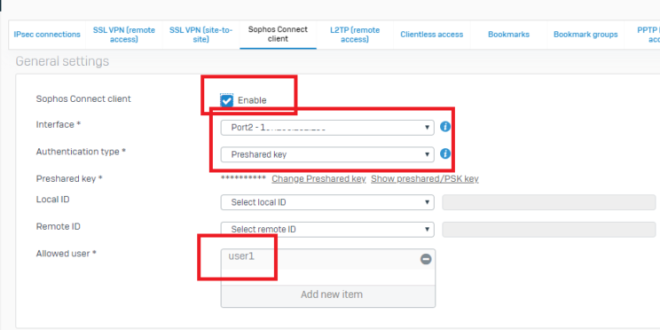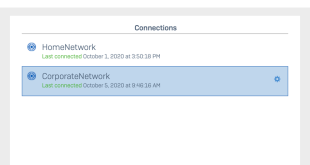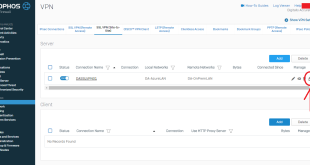If you’re a user of the Sophos VPN client, you may have encountered the frustration of experiencing timeouts during your VPN sessions. These timeouts can disrupt your workflow and cause delays in accessing important resources. In this blog post, we will explore the issue of Sophos VPN client timeouts and provide valuable insights on how to overcome them.
Many users have reported experiencing difficulties with the Sophos VPN client, particularly when it comes to timeouts. These timeouts occur when the client fails to establish or maintain a connection with the VPN server. This can lead to frequent disconnections and interruptions in your remote access capabilities, making it difficult to work efficiently.
The main target of Sophos VPN client timeouts is to provide a secure and reliable connection between remote users and corporate networks. However, due to various factors such as network congestion, server load, or configuration issues, timeouts can occur, resulting in a subpar user experience.
In summary, Sophos VPN client timeouts can be a frustrating issue that users may encounter when trying to establish a secure connection with their corporate networks. These timeouts can disrupt workflow and cause delays in accessing important resources. However, by understanding the causes and implementing recommended solutions, users can overcome these challenges and enjoy a seamless VPN experience.
Table of Contents
Sophos VPN Client Timeout: Understanding the Issue
One of the most common pain points for Sophos VPN client users is the occurrence of timeouts. Timeouts can be caused by a variety of factors, including network congestion, server load, or misconfigured client settings. When a timeout occurs, the client is unable to establish or maintain a connection with the VPN server, resulting in a loss of access to corporate resources.
To further understand the issue, let’s dive into an example. John, a remote worker, relies on the Sophos VPN client to securely connect to his company’s network. However, he frequently encounters timeouts during his VPN sessions, which disrupts his productivity. These timeouts can be frustrating, as John relies on the VPN connection to access important files and collaborate with his team.
To address the issue of Sophos VPN client timeouts, it’s essential to examine its root causes. One potential cause is network congestion. As more users connect to the VPN server, the network may become overloaded, leading to increased latency and timeouts. Another factor could be server load. If the VPN server is handling a large number of concurrent connections, it may struggle to maintain stable connections for all users.
Misconfigured client settings can also contribute to timeouts. Issues such as incorrect authentication settings, incompatible protocols, or outdated client versions can hinder the establishment of a successful VPN connection. It’s crucial to ensure that the client settings are properly configured and up-to-date to mitigate timeout issues.

By understanding the issue of Sophos VPN client timeouts and their potential causes, users can take proactive steps to address and prevent these disruptions in their VPN sessions. Ensuring a stable and reliable VPN connection is essential for maintaining productivity and secure remote access to corporate resources.
What is Sophos VPN Client Timeout?
Sophos VPN client timeout is a temporary loss of connection between the client and the VPN server. It occurs when the client fails to establish or maintain a connection within a specified period. This timeout can disrupt remote access capabilities and cause users to experience intermittent disconnections.
Sophos VPN client timeout typically happens when there is a delay in establishing a secure tunnel between the client and the VPN server. Factors such as network congestion, server load, or misconfigured client settings can contribute to this issue. When a timeout occurs, users may need to manually reconnect to the VPN server, disrupting their workflow and causing frustration.
It’s important to address Sophos VPN client timeouts, as they can hinder productivity and compromise the security of remote connections. By understanding the causes and implementing best practices, users can minimize the occurrence of timeouts and maintain a stable VPN connection.

The History and Myth of Sophos VPN Client Timeout
Understanding the history and myths surrounding Sophos VPN client timeouts can provide valuable insights into the development of this issue and the misconceptions associated with it.
One common myth is that Sophos VPN client timeouts are solely caused by network-related factors. While network congestion and server load can contribute to timeouts, they are not the only factors at play. Misconfigured client settings and outdated client versions can also introduce timeout issues.
Over the years, Sophos has continually improved its VPN client’s performance and stability. By releasing updates and addressing known issues, Sophos aims to provide users with a reliable and secure VPN experience. It’s important for users to stay updated with the latest client versions and take advantage of the improvements and optimizations offered by Sophos.
Historically, Sophos VPN client timeouts have been a persistent challenge for remote workers and IT administrators. However, by understanding the causes and implementing best practices, organizations and users can overcome these issues and ensure a seamless VPN experience.
The Hidden Secret of Sophos VPN Client Timeout
Behind the scenes, Sophos VPN client timeout issues can be the result of various hidden secrets. These secrets are the combination of factors that contribute to the occurrence of timeouts and hinder the establishment of stable VPN connections.
One key hidden secret is the impact of network infrastructure on VPN performance. The quality and stability of the network infrastructure play a crucial role in determining the success or failure of VPN connections. Issues such as packet loss, high latency, or unreliable internet connectivity can introduce instability and increase the likelihood of timeouts.
Another hidden secret is the importance of client-side configurations. In some cases, misconfigured client settings can prevent the establishment of a successful VPN connection. It’s essential to ensure that the client settings align with the VPN server requirements and industry best practices.
By understanding and addressing these hidden secrets, users can optimize their VPN connections and reduce the occurrence of timeouts. Collaborating with IT administrators and following best practices can significantly improve the reliability of Sophos VPN client connections.
Recommendation for Sophos VPN Client Timeout
When facing Sophos VPN client timeout issues, it’s crucial to implement recommended practices to minimize disruptions and optimize VPN connections. Here are some recommendations to overcome these challenges:
- Ensure network stability: Address network-related issues, such as packet loss, high latency, or unreliable connectivity, to improve the stability of your VPN connection.
- Keep client settings up-to-date: Regularly update the Sophos VPN client and ensure that the client settings align with the VPN server requirements.
- Work with IT administrators: Collaborate with your IT team to troubleshoot and resolve any configuration or server-side issues that may be causing timeouts.
- Implement load balancing: If your organization handles a large number of concurrent VPN connections, consider implementing load balancing techniques to distribute the server load and improve connection stability.
By following these recommendations, users can optimize their Sophos VPN client experience and minimize the occurrence of timeouts. Remember, a stable and reliable VPN connection is essential for ensuring secure remote access and maintaining productivity.
Sophos VPN Client Timeout and Related Keywords
Sophos VPN client timeout is a critical issue that can affect users’ remote access capabilities. To provide a comprehensive understanding of the topic, let’s delve deeper into related keywords:
- Sophos VPN client timeout
- Sophos VPN client
- timeout issues
- VPN connection stability
- network congestion
- server load
- misconfigured client settings
- network infrastructure
- client-side configurations
- recommended practices
Now that we’ve explored the topic of Sophos VPN client timeout and its related keywords, let’s move on to discussing some tips to help you overcome timeout issues and ensure a smooth VPN experience.
Tips to Overcome Sophos VPN Client Timeout
Overcoming Sophos VPN client timeout issues is crucial for maintaining productivity and efficient remote access. Here are some tips to help you overcome these challenges:
- Optimize network performance: Assess and improve your network infrastructure to ensure stability and minimize latency.
- Update your VPN client: Stay up-to-date with the latest versions of the Sophos VPN client to take advantage of performance improvements and bug fixes.
- Double-check client settings: Verify that your client settings align with the VPN server requirements and best practices.
- Monitor server load: Keep an eye on the server load and take appropriate measures, such as load balancing, to distribute the load evenly.
- Collaborate with IT: Reach out to your IT team for assistance in troubleshooting and resolving any configuration or server-side issues.
By implementing these tips, you can optimize your Sophos VPN client experience and minimize the occurrence of timeouts, ensuring a seamless and secure remote access experience.
Question and Answer
Here are some common questions related to Sophos VPN client timeout:
Q: How can I troubleshoot Sophos VPN client timeout issues?
A: Start by checking your network stability and verifying your client settings. If the issue persists, collaborate with your IT team for further troubleshooting and resolution.
Q: How often do Sophos VPN client timeouts occur?
A: The frequency of timeouts can vary depending on factors such as network conditions, server load, and client configurations. Regularly monitoring and optimizing your VPN setup can help minimize the occurrence of timeouts.
Q: Can I prevent Sophos VPN client timeouts entirely?
A: While it may not be possible to prevent timeouts completely, following best practices and maintaining an optimized VPN setup can significantly reduce their occurrence.
Q: Are timeouts an indication of a security issue?
A: Timeouts are typically not indicative of a security issue. They are more commonly caused by network-related factors or misconfigured client settings.
Conclusion of Sophos VPN Client Timeout
In conclusion, Sophos VPN client timeout can be a frustrating issue that disrupts your remote access capabilities and hinders productivity. By understanding the causes of timeouts and implementing recommended practices, users can optimize their VPN connections and minimize disruptions. Remember to ensure network stability, keep client settings up-to-date, collaborate with IT administrators, and implement load balancing techniques when needed. With these measures in place, you can enjoy a secure and reliable VPN experience, enabling seamless remote access to corporate resources.
 cobabybarcelona Latest Updated Live News cobabybarcelona
cobabybarcelona Latest Updated Live News cobabybarcelona



